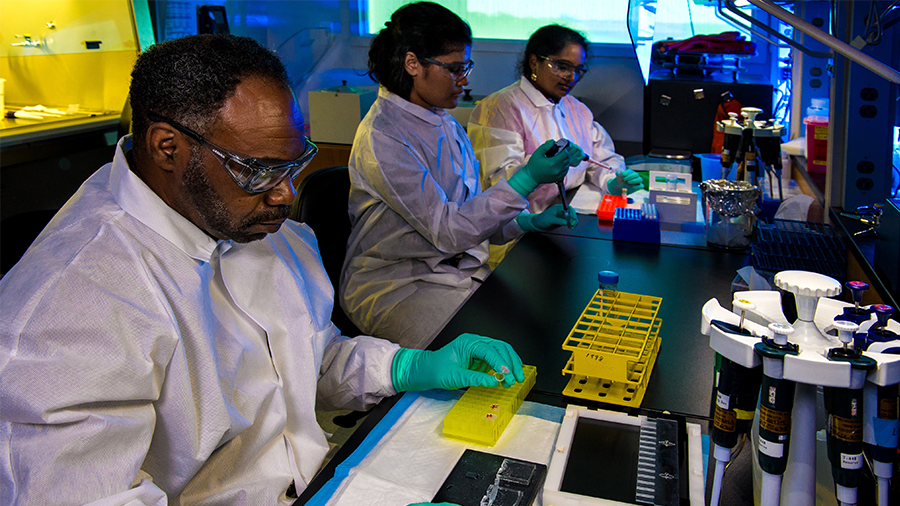Investigating public health careers
Public health is a multidisciplinary field that connects the physical and social sciences to ensure the safety and health of all people. Public health scientists come from many disciplines, including molecular biology, microbiology, occupational health and toxicology. These experts use their knowledge of science and technical and analytical skills to identify and monitor threats, promote public awareness and prevent or stop the spread of diseases.
Public health scientists work at the global, national, state, regional, city or community levels. They create plans when problems occur, such as the Flint, Michigan, water crisis, listeria contamination and the recent coronavirus outbreak. They also engage in science policy, education and communication activities to keep the public safe and informed.
If you want to be at the forefront of disease prevention, become a disease detective!

You must be committed to the greater good: A good public health professional cares about the health and safety of everyone. The Centers for Disease Control and Prevention, for example, works 24/7 to protect people from health, safety and security threats, both abroad and in the U.S. The agency's employees are committed to domestic preparedness, eliminating disease and ending epidemics.
You need to think on your feet: Diseases can travel fast, depending on the vector, geography, government policies and the populations affected. As a public health scientist, you will be responsible for working quickly and making time-sensitive decisions, often with limited money and resources. You'll also need to collaborate, while under pressure, with other people with varied areas of expertise.
You need to be a good communicator: A good public health scientist can translate technical information in such a way that a person without scientific training will understand it. It's also important to be able to gain the public's trust. If you're interested in strengthening your science communication skills, sign up for the ASBMB’s online course, the Art of Science Communication.
Find your area of specialty: Are you interested in a particular region, population, disease or something else? Follow the news, keep up to date with ASBMB and attend panels to learn more about disease research. Think about your favorite science courses, research experiences and what excites you about public health.
Apply to fellowships
Some scientists earn master's degrees in public health, while others complete fellowships. Fellowships are a great way to dive in the public health field, gain access to professional development tools and acquire skills. Many fellows at the CDC and in the Association of Public Health Laboratories system end up with permanent jobs at the agency or another public health laboratory.
The CDC has many fellowships. One that is particularly interesting is the Evaluation Fellowship Program. About 20 fellows are chosen each year. It is a two-year program with the second year depending on performance and funding. Fellows earn a salary, medical insurance, sick and vacation leave, and financial support for professional development. The deadline is March 31.
The APHL has a partnership with the CDC and has six APHL–CDC fellowship programs. All programs include 15 core competencies which include: management and leadership; communications; general laboratory practice; research; surveillance; ethics; safety; emergency management and response; and quality management systems.
All APHL fellowships are 12 months and full time for master's- and doctoral-degree holders. Fellows receive stipends, medical insurance, travel to the host laboratory, professional developing, training at the CDC and complimentary APHL membership. Applications are due Feb. 29.
The Antimicrobial Resistance Fellowship Program focuses on the advancement of molecular methodologies, surveillance, research, communication and outreach. The goal is to introduce fellows to public health laboratory science, detection and responding to antimicrobial resistance. Fellows are placed at one of the seven regional laboratories or on CDC's main campus.
The Bioinformatics Fellowship Program focuses on using bioinformatics tools to detect and track infectious diseases. The goal is to use next-generation sequencing technologies for outbreak and pathogen surveillance. Fellows are placed in a CDC or APHL member local and state laboratories.
Sounds exciting? Check out these resources to learn more about public health.
- Next strain is a real-time open-source project in which scientists and public health professionals can track pathogen genome data.
- If you are curious about how disease travels, play VAX, a game about an epidemic prevention, designed by the Salathe Group.
Enjoy reading ASBMB Today?
Become a member to receive the print edition four times a year and the digital edition monthly.
Learn moreFeatured jobs
from the ASBMB career center
Get the latest from ASBMB Today
Enter your email address, and we’ll send you a weekly email with recent articles, interviews and more.
Latest in Careers
Careers highlights or most popular articles

Upcoming opportunities
ASBMB's PROLAB award helps graduate students and postdoctoral fellows spend up to six months in U.S. or Canadian labs.

From humble beginnings to unlocking lysosomal secrets
Monther Abu–Remaileh will receive the ASBMB’s 2026 Walter A. Shaw Young Investigator Award in Lipid Research at the ASBMB Annual Meeting, March 7-10 in Washington, D.C.

Chemistry meets biology to thwart parasites
Margaret Phillips will receive the Alice and C. C. Wang Award in Molecular Parasitology at the ASBMB Annual Meeting, March 7-10 in Washington, D.C.

Decoding how bacteria flip host’s molecular switches
Kim Orth will receive the Earl and Thressa Stadtman Distinguished Scientists Award at the ASBMB Annual Meeting, March 7–10, just outside of Washington, D.C.

Defining JNKs: Targets for drug discovery
Roger Davis will receive the Bert and Natalie Vallee Award in Biomedical Science at the ASBMB Annual Meeting, March 7–10, just outside of Washington, D.C.

Upcoming opportunities
No matter where you are in your career and what future path you aspire to, everyone needs leadership skills. Join ASBMB for practical strategies for building and practicing leadership skills.

